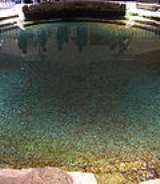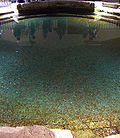
The Ruin
Encyclopedia

Anglo-Saxon literature
Old English literature encompasses literature written in Old English in Anglo-Saxon England, in the period from the 7th century to the Norman Conquest of 1066. These works include genres such as epic poetry, hagiography, sermons, Bible translations, legal works, chronicles, riddles, and others...
from the Exeter Book
Exeter Book
The Exeter Book, Exeter Cathedral Library MS 3501, also known as the Codex Exoniensis, is a tenth-century book or codex which is an anthology of Anglo-Saxon poetry. It is one of the four major Anglo-Saxon literature codices. The book was donated to the library of Exeter Cathedral by Leofric, the...
by an unknown author. The Exeter Book is a large book of mostly Christian verse, which contains about one-third of the extant Old English poems. The poem's subject is ancient Roman ruins, built of stone and having hot water, assumed to be the ruins of Aquae Sulis
Aquae Sulis
Aquae Sulis was a small town in the Roman province of Britannia. Today it is known as Bath, located in the English county of Somerset.-Baths and temple complex:...
at modern Bath, Somerset, and the powerful fate (Weird
Weird
The word weird may refer to:*"odd, uncanny", see surreal humour, mental confusion, freak*Wyrd, the Germanic concept of fate; Weird Sisters, the Germanic Fates*"Weird", a song from Hilary Duff's Hilary Duff *"Weird"...
or Wyrd
Wyrd
Wyrd is a concept in Anglo-Saxon culture roughly corresponding to fate or personal destiny. The word is ancestral to Modern English weird, which retains its original meaning only dialectally....
) that has reduced to ruins a once-lively community and its sturdy stone buildings.
The manuscript
Part of the poem has been lost due the pages being damaged by fire. "The Ruin" is somewhat ambiguously positioned in the Exeter Book between "Husband's Message" and 34 preceding riddles. The poem itself is written near the end of the manuscript, written on both sides of a leaf with the end of the poem continuing on to the next page. The manuscript with "The Ruin" included in it has a large diagonal burn from a kind of branding in the center of the page. The burn rendered many parts of the script illegible.The poem and a version in modern English
Web browser A web browser is a software application for retrieving, presenting, and traversing information resources on the World Wide Web. An information resource is identified by a Uniform Resource Identifier and may be a web page, image, video, or other piece of content... s may not display some special characters in this section. |
|
| Original Old English Old English language Old English or Anglo-Saxon is an early form of the English language that was spoken and written by the Anglo-Saxons and their descendants in parts of what are now England and southeastern Scotland between at least the mid-5th century and the mid-12th century... | Modern English |
|---|---|
Wrætlic is þes wealstan, wyrde gebræcon; burgstede burston, brosnað enta geweorc. Hrofas sind gehrorene, hreorge torras, hrungeat berofen, hrim on lime, scearde scurbeorge scorene, gedrorene, ældo undereotone. Eorðgrap hafað waldend wyrhtan forweorone, geleorene, heardgripe hrusan, oþ hund cnea werþeoda gewitan. Oft þæs wag gebad ræghar ond readfah rice æfter oþrum, ofstonden under stormum; steap geap gedreas. Wonað giet se ...num geheapen, fel on grimme gegrunden scan heo... ...g orþonc ærsceaft ...g lamrindum beag mod mo... ...yne swiftne gebrægd hwætred in hringas, hygerof gebond weallwalan wirum wundrum togædre. Beorht wæron burgræced, burnsele monige, heah horngestreon, heresweg micel, meodoheall monig mondreama full, oþþæt þæt onwende wyrd seo swiþe. Crungon walo wide, cwoman woldagas, swylt eall fornom secgrofra wera; wurdon hyra wigsteal westen staþolas, brosnade burgsteall. Betend crungon hergas to hrusan. Forþon þas hofu dreorgiað, ond þæs teaforgeapa tigelum sceadeð hrostbeages hrof. Hryre wong gecrong gebrocen to beorgum, þær iu beorn monig glædmod ond goldbeorht gleoma gefrætwed, wlonc ond wingal wighyrstum scan; seah on sinc, on sylfor, on searogimmas, on ead, on æht, on eorcanstan, on þas beorhtan burg bradan rices. Stanhofu stodan, stream hate wearp widan wylme; weal eall befeng beorhtan bosme, þær þa baþu wæron, hat on hreþre. þæt wæs hyðelic. Leton þonne geotan ofer harne stan hate streamas un... ...þþæt hringmere hate þær þa baþu wæron. þonne is ...re; þæt is cynelic þing, huse ...... burg.... |
This masonry is wondrous; fates broke it courtyard pavements were smashed; the work of giants is decaying. Roofs are fallen, ruinous towers, the frosty gate with frost on cement is ravaged, chipped roofs are torn, fallen, undermined by old age. The grasp of the earth possesses the mighty builders, perished and fallen, the hard grasp of earth, until a hundred generations of people have departed. Often this wall, lichen-grey and stained with red, experienced one reign after another, remained standing under storms; the high wide gate has collapsed. Still the masonry endures in winds cut down persisted on__________________ fiercely sharpened________ _________ ______________ she shone_________ _____________g skill ancient work_________ _____________g of crusts of mud turned away spirit mo________yne put together keen-counselled a quick design in rings, a most intelligent one bound the wall with wire brace wondrously together. Bright were the castle buildings, many the bathing-halls, high the abundance of gables, great the noise of the multitude, many a meadhall full of festivity, until Fate the mighty changed that. Far and wide the slain perished, days of pestilence came, death took all the brave men away; their places of war became deserted places, the city decayed. The rebuilders perished, the armies to earth. And so these buildings grow desolate, and this red-curved roof parts from its tiles of the ceiling-vault. The ruin has fallen to the ground broken into mounds, where at one time many a warrior, joyous and ornamented with gold-bright splendour, proud and flushed with wine shone in war-trappings; looked at treasure, at silver, at precious stones, at wealth, at prosperity, at jewellery, at this bright castle of a broad kingdom. The stone buildings stood, a stream threw up heat in wide surge; the wall enclosed all in its bright bosom, where the baths were, hot in the heart. That was convenient. Then they let pour_______________ hot streams over grey stone. un___________ _____________ until the ringed sea (circular pool?) hot _____________where the baths were. Then is_______________________ __________re, that is a noble thing, to the house__________ castle_______ |
Origins of the work
Although the poem shows no overt signs of Christianity, it could be the work of an early Anglo-SaxonAnglo-Saxons
Anglo-Saxon is a term used by historians to designate the Germanic tribes who invaded and settled the south and east of Great Britain beginning in the early 5th century AD, and the period from their creation of the English nation to the Norman conquest. The Anglo-Saxon Era denotes the period of...
Christian. The poet, however, does make several references to Wyrd
Wyrd
Wyrd is a concept in Anglo-Saxon culture roughly corresponding to fate or personal destiny. The word is ancestral to Modern English weird, which retains its original meaning only dialectally....
, an element of North-Germanic pagan mythology.
Modern literary criticism
Although the poem appears a straightforward description of the visual appearance of the site, the author's non-Roman assumptions about the kind of activities that the building would have sheltered, and his emotional state concerning the decay of the ruins, allow different interpretations to be brought forth. William Johnson sees the poem not as a reflection of the physical appearance of the site but rather an evocative effort to bring "stone ruins and human beings into polar relationship as symbolic reflections of each other." Johnson further sees the poem as a metaphor for human existence, a demonstration that all beauty must come to an end. Looked at this way, the author of "The Ruin" could be describing the downfall of the Roman Empire by showing its once great and beautiful structure reduced to rubble just as the empire was. Where "The Ruin" can be seen from a sentimental perspective, it may also be viewed from an imagisticImagism
Imagism was a movement in early 20th-century Anglo-American poetry that favored precision of imagery and clear, sharp language. The Imagists rejected the sentiment and discursiveness typical of much Romantic and Victorian poetry. This was in contrast to their contemporaries, the Georgian poets,...
perspective. Arnold Talentino sees the poem as not a sorrowful lamentation, but as an angry or realistic condemnation of the actual people who wrought the destruction. This interpretation would be more historically realistic in that it would reflect a very Christian view of the destruction, a common theme in Old English poems. Talentino states, "His [the author's] view of what once was and his thoughts about it indicate that the city's former inhabitants caused its fall, that crumbling walls are, in part at least, the effect of a crumbling social structure."
Another critic points out the irony of a poem about ruins being found on a burned manuscript page, saying that the burn is "an eloquent image of the theme of mutability with which the poem is concerned" as both evoke destruction.
"The Ruin" shares the melancholic worldview of some of its contemporary poems such as The Seafarer
Seafarer (poem)
The Seafarer is an Old English poem recorded in the Exeter Book, one of the four surviving manuscripts of Old English poetry. It consists of 124 lines, followed by the single word "Amen". In the past it has been frequently referred to as an elegy, a poem that mourns a loss, or has the more general...
, The Wanderer
The Wanderer (poem)
The Wanderer is an Old English poem preserved only in an anthology known as the Exeter Book, a manuscript dating from the late 10th century. It counts 115 lines of alliterative verse...
and Deor
Deor
"Deor" is an Old English poem found in the late 10th century collection the Exeter Book. The poem consists of the lament of the scop Deor, who lends his name to the poem, which was given no formal title. Modern scholars do not actually believe Deor to be the author of this poem.In the poem, Deor's...
.
Modern musical settings
An alternative rendition of the poem in Modern English, was set by Peter HammillPeter Hammill
Peter Joseph Andrew Hammill is an English singer-songwriter, and a founding member of the progressive rock band Van der Graaf Generator. Most noted for his vocal abilities, his main instruments are guitar and piano...
to music as the song "Imperial Walls", on his 1979 album pH7
PH7 (Peter Hammill album)
pH7 is an album by Peter Hammill, originally released on Charisma Records in September 1979. It was Hammill's 8th solo album and his last release on the Charisma label....
. Another version, by Michael Alexander, was set by Nicholas Maw
Nicholas Maw
John Nicholas Maw was a British composer.-Biography:Born in Grantham, Lincolnshire, Maw was the son of Clarence Frederick Maw and Hilda Ellen Chambers. He attended the Wennington School, a boarding school, in Wetherby in the West Riding of Yorkshire. His mother died of tuberculosis when he was 14...
as his piece 'The Ruin' for double eight-part chorus and solo horn.
Further reading
- Anglo-Saxon poetry: an anthology of Old English poems tr. S. A. J. BradleySid BradleySid Bradley is an academic, author and specialist in Anglo-Saxon literature.In his best known publication, Anglo-Saxon Poetry, Bradley has translated into modern English prose virtually the entire corpus of extant Anglo-Saxon poetry....
. London: Dent, 1982 (translation into English prose). - The Earliest English Poems tr. Michael Alexander. Penguin Classics. (Translation into English verse).
External links
- The Ruin in an Anglo-Saxon anthology edited by N. Chadwick and hosted at the Internet ArchiveInternet ArchiveThe Internet Archive is a non-profit digital library with the stated mission of "universal access to all knowledge". It offers permanent storage and access to collections of digitized materials, including websites, music, moving images, and nearly 3 million public domain books. The Internet Archive...

